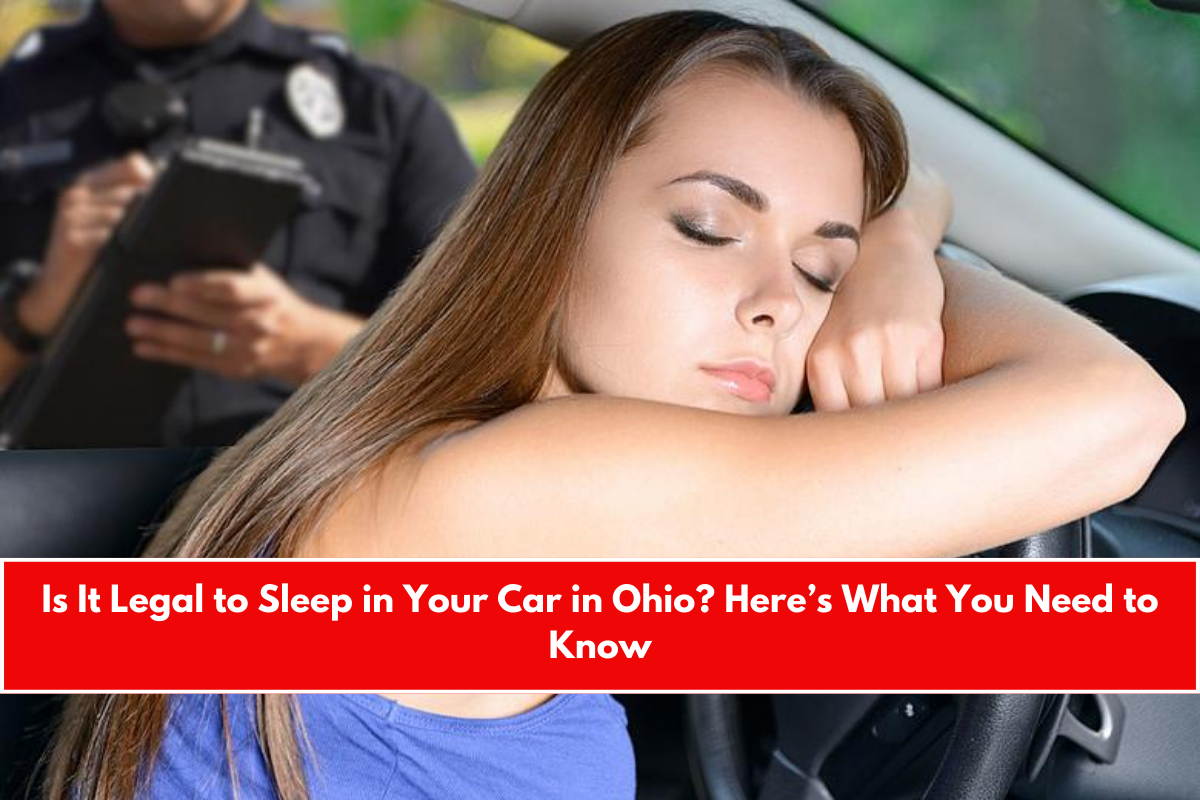Can You Legally Sleep in Your Car in Ohio? A 2025 Guide for Drivers
Whether you’re on a road trip, short on money, or simply too tired to drive, sleeping in your car can seem like a practical solution. But is it legal to do so in Ohio? While some states have strict rules, Ohio offers more flexibility, but there are still things you must know to stay safe and within the law.
This article breaks down Ohio’s rules on sleeping in a vehicle, explains where you can park, and outlines what precautions to take to avoid legal trouble—especially if alcohol is involved.
Why Do People Sleep in Their Cars?
People choose to sleep in their cars for different reasons:
To Save Money on Travel
Staying at hotels can be expensive. Many travellers, especially those on long drives, prefer sleeping at rest stops or truck stops to cut down on accommodation costs.
To Prevent Driver Fatigue
Driving while tired is dangerous. If you feel drowsy behind the wheel, it’s safer to pull over and rest rather than risk an accident.
Due to Homelessness
Unfortunately, some people have no choice but to sleep in their cars because they’ve lost access to stable housing. In these cases, the car becomes a temporary shelter.
Is It Legal to Sleep in Your Car in Ohio?
Yes, Ohio does not have any statewide law banning people from sleeping in their cars. As long as your vehicle is legally parked in a safe spot, you can nap or sleep inside it. But it’s important to know where you’re allowed to park overnight.
Safe and Legal Places to Sleep in Your Car in Ohio
Here are places where it’s generally legal to sleep in your vehicle:
Rest Areas
Ohio rest areas are open 24/7 and do not prohibit overnight sleeping. There’s no official time limit if you’re inside your vehicle. While the state mentions a 3-hour limit for unattended vehicles, drivers present in their cars can stay longer to rest.
Truck Stops and Travel Plazas
These are another good option. They welcome tired drivers and are often equipped with restrooms, food, and fuel.
24-Hour Retail Parking Lots (e.g., Walmart)
Some big retail chains allow overnight parking, but it’s best to ask the store manager for permission.
Campgrounds and Designated Camping Spots
If you’re looking to sleep in comfort, consider renting a space at a nearby campground.
Private Property (With Permission)
You can legally sleep in your car on private property if you own the land or have explicit permission from the owner.
Places You Should Avoid Sleeping in Your Car
Public Streets
Sleeping overnight in a car parked on public roads is not recommended. It can cause traffic issues or even attract police attention. You may face fines or be asked to leave.
“No Parking” Zones
Always watch for signs. If you park in a restricted area, you could get ticketed or towed—even if you’re just sleeping.
Residential Areas
Parking outside homes, especially at night, may raise concerns with residents or law enforcement.
Can Police Approach You While You’re Sleeping in Your Car?
Yes. Even if you’re doing nothing wrong, officers might check on your well-being if they see someone sleeping in a parked car. This is usually done out of concern for safety, especially at night or in remote areas.
What If You’re Sleeping in the Car After Drinking?
This is where things get tricky. Sleeping in your car while intoxicated could lead to a DUI (Driving Under the Influence) charge in Ohio—even if the car isn’t moving.
What the Law Says
Under Ohio Revised Code Section 4511.01 (HHH), a person can be charged if there’s evidence they were operating or had operated the vehicle under the influence.
What Could Count as “Operating a Vehicle”
Police may look for signs like:
- The engine is running or warm
- Keys are in the ignition
- The person is in the driver’s seat
- The car is on the side of a road or near an accident scene
Even if you’re not driving, these signs may suggest you recently operated the vehicle while intoxicated.
How to Avoid a DUI While Sleeping in Your Car Drunk
If you have no other option, here are some steps that can reduce the risk of a DUI:
- Sleep in the back seat
- Remove the keys from the ignition
- Do not turn on the engine or music
- Avoid parking on the side of a highway
These actions help show that you had no intention to drive while under the influence.
Is Camping Allowed in Rest Areas?
No. While resting or sleeping is allowed, camping is not. That means:
- No tents
- No barbecues or campfires
- No setting up outside the vehicle
Rest areas are designed for short breaks—not recreational stays.
Local Laws May Vary
While Ohio doesn’t have a state ban, some cities or counties may have stricter rules. Always check local laws before deciding to sleep in your car, especially in unfamiliar areas.
In Ohio, sleeping in your car is generally legal if done in the right places, such as rest stops or private property with permission. It’s a safe and practical option for tired travellers or people in financial difficulty. However, be cautious about sleeping in your vehicle if you’ve consumed alcohol, as you could still face DUI charges.
Drivers should always follow parking rules, avoid public roads, and understand the difference between resting and camping. When in doubt, it’s best to consult legal professionals like Schuerger Shunnarah Trial Attorneys in Toledo, who can guide you through the law and your rights as a driver.


















Leave a Reply